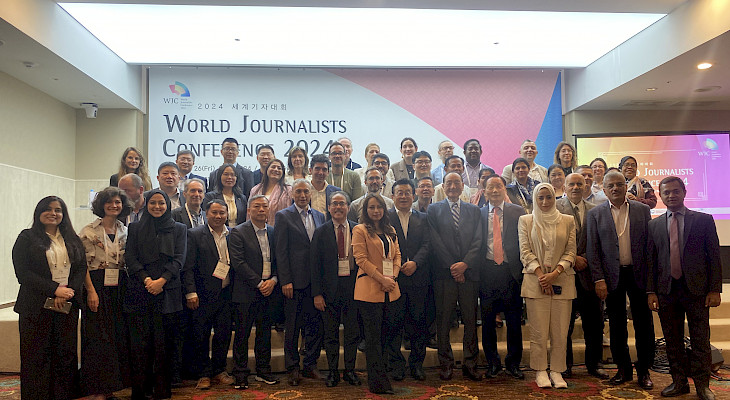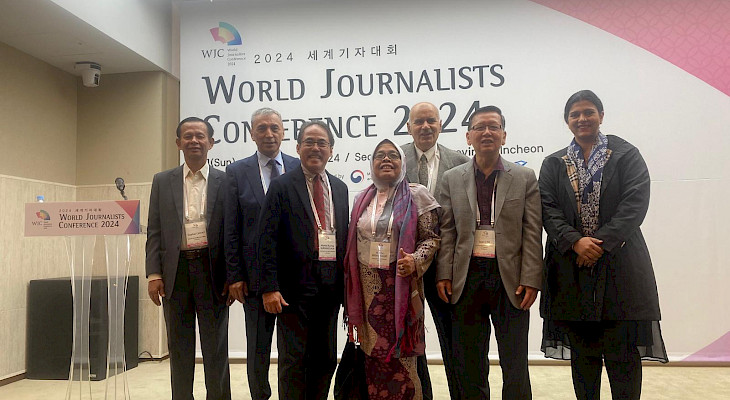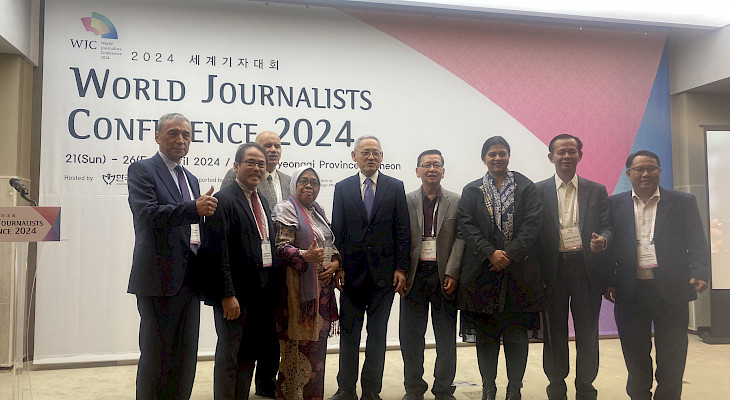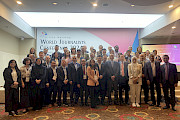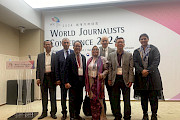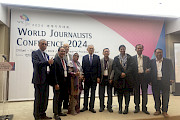Over 100 journalists from around 50 countries, including Asia, Europe, Africa, and Latin America, attended the World Journalists Conference 2024 in South Korea. Organized by the Korean Journalists Association, the conference took place from April 21 to 26 in Seoul and Gyeonggi Province. Participants of the journalistic forum discussed two current topics of the moment - "The Role of Media in War Journalism and Peace Worldwide" and "Navigating the Horizon: Artificial Intelligence and the Future of Media."
The conference occurred during a complex period globally. The war in Ukraine, tensions in many European and Middle Eastern countries, unrestrained aggression against Palestine, coupled with growing tensions in various areas worldwide, including the situation on the border between South and North Korea.
According to some conference participants, the painstakingly built world order over the past 70 years has been significantly shaken due not only to political but also economic and even moral-ethical disagreements. The more or less coordinated international order is collapsing before our eyes, and its consequences are challenging to predict.
In these circumstances, the role of mass media, along with journalists, active social media users, and bloggers, increases exponentially. Another current topic is the influence of artificial intelligence on society itself and primarily on media representatives and journalists. Artificial intelligence has reached a level where the media and journalists are forced to live in a digital environment and deal with new challenges of the era, such as fact distortion, dissemination of fake news, and spreading of aggressive and provocative materials, which can reach large distances and audiences instantly, further complicating the modern world.
Media literacy among the population worldwide is significantly lacking, allowing it to be relatively easy to impose a certain opinion, devoid of truth and reality, especially in social networks. This outlines the area of work for journalists to restore justice and thereby affirm the trust that professional and unbiased journalists commanded before the digital age.
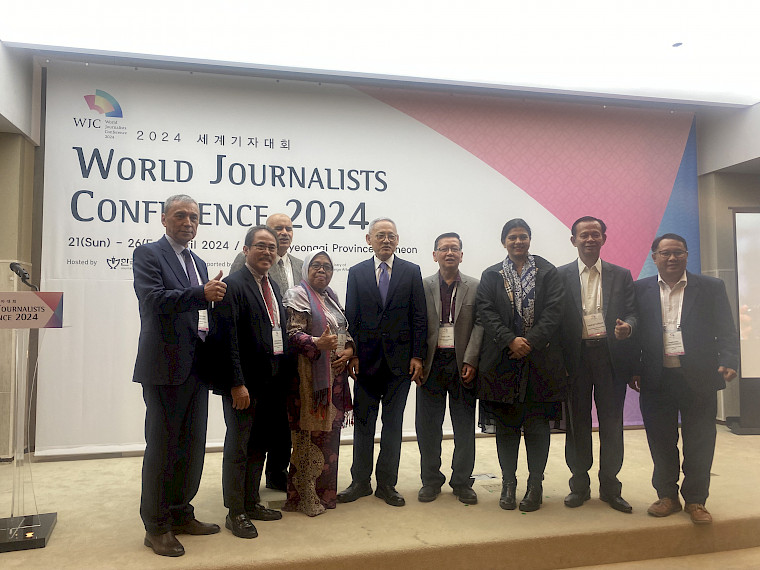
Journalists from Asia
Undoubtedly, journalists must remain impartial and objective, contributing to global peace preservation. Media faces numerous pressing issues affecting humanity - combating climate change, terrorism, illegal drug trafficking, human trafficking (especially women and children), environmental protection, sustainable development, and preventing global pandemics.
Through their truthful articles, professional media and practicing journalists can genuinely contribute to building a harmonious world and be prepared to challenge the era of artificial intelligence.
The World Journalists Conference is not by chance held in South Korea. With a population of 50 million and a developed democratic system, South Korea hosts a free press facing the same problems encountered by colleagues worldwide. However, the two topics highlighted as primary in the conference are familiar to Korean journalists.
The coverage of events in global hotspots has always remained at the forefront of media attention. South Korea has maintained stable tension on its border with its neighbor for over 70 years. Despite some easing of relations between the countries 5-6 years ago, the tension has now risen again, becoming an important topic for Korean journalists.
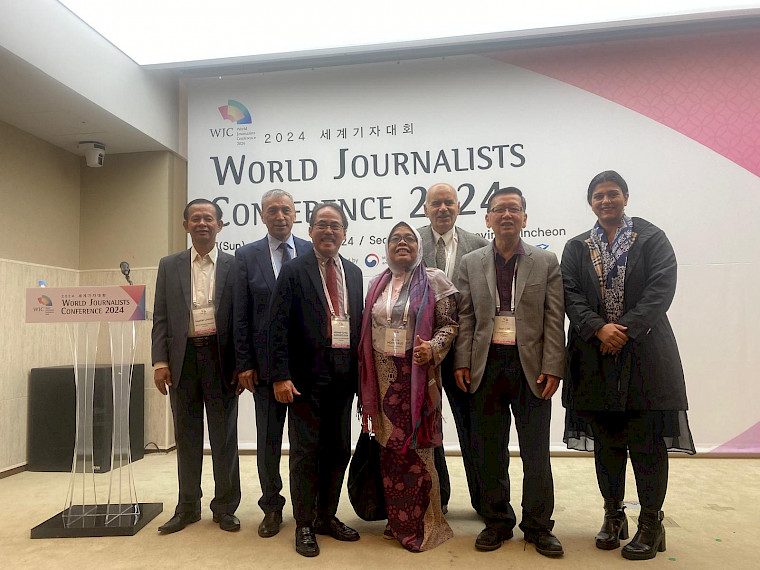
Members of AJA
On the other hand, South Korea is one of the world's most rapidly changing countries in technological terms. As a result, the digital era has encompassed all spheres of life, particularly affecting media and journalists themselves. Therefore, the second topic at the conference, shared by representatives from several countries, was also of interest to Korean colleagues. Indeed, the experience and ideas of Korean media representatives were very intriguing to all forum participants.
Officials from Korea who participated in the conference emphasized the timeliness of the discussed topics and called on participants to be sincere and open when sharing their opinions. The head of the Korean Journalists Association, Pak Jeong-hun, expressed hopes that the conference "will be a turning point for discussing how journalism can expand its influence beyond reporting to contribute to an era of peace and security."
The topics discussed at the conference must be studied and understood by journalists, stated the Head of the Korean Journalists Association (KJA). "Our unity is rooted in a common commitment to journalism, overcoming differences in nationality, gender, skin color, and ideology," emphasized Pak Jeong-hun.
According to statements from all speakers, in current conditions, journalists are obligated to remain patriots of their profession and exert maximum efforts to reduce the negative impact of aggressive journalism on public opinion. The main task for representatives of all media is to be maximally objective, impartial, and trustworthy.
From this, the following conclusion can be drawn - global journalism, experiencing a complex transitional period into the digital age, must now focus not just on informing society, but on educating media literacy, both for the public and the information sources themselves, such as popular bloggers. Anyone can inform the public, but teaching them to navigate the ever-increasing flow of information can only be done by media representatives. Only in this way can we be confident that public trust in the media will be restored.
The Korean Journalists Association is the leading union of journalists in South Korea. It was established in 1964 and has over 10,000 journalists as members from more than 200 media outlets in South Korea. The association has extensive experience in organizing the World Journalists Conference. The current conference is the 12th since 2013. Each year, the participation of conference attendees grows, reflecting increasing interest, as it addresses the most important current issues on the global agenda.
Kuban Abdymen,
Bishkek-Seoul

